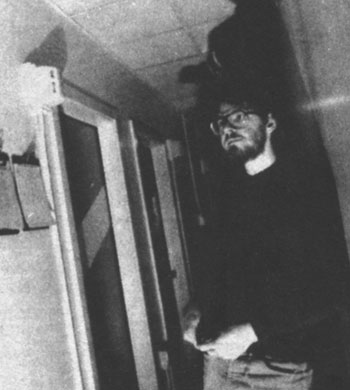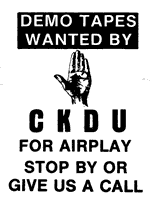|
Promise of Performance: Why CKDU-FM is becoming a better alternative. by Craig Benjamin |
 |
|
Part way through the interview Mark MacLeod is interrupted by a phone call. It's January 5; a program called Jazz on A Sunday Afternoon is on the air. The caller wants to know what's happened to Caribbean Jam, a specialty program that's been played on or around this time every Sunday since CKDU first went on the air. MacLeod explains that he's moved the show to Saturday afternoons, beginning this week. "It's one of those positive changes," he tells the caller. As he hangs up, MacLeod laughs. "Oh boy, I know I'm going to get a lot of those calls." He's clearly pleased with the prospect. The time change for Caribbean Jam is only one of many revisions MacLeod is making in the CKDU program schedule, effective this morning. It's his first tangible accomplishment since coming to the Halifax student station last October as the new program director. This call, the first public response to the changes, indicates that there is, in fact, an audience out there that's interested in the station he hopes to improve. "I've heard some people in some jobs say, 'If I get a better offer I'll move,' but what has motivated me everyday to work here is hard to describe in terms of a better offer," MacLeod says. "I mean there's a great challenge here. It's a great city. There's a great collaboration of people here. And there's a job that CKDU can do." Dalhousie students have been listening to the station on closed-circuit since the late Sixties, but for many community members CKDU's first FM broadcast last February was their first encounter with student radio. Starting with a song from the rough-edged progressive rock band Joy Division and moving on to music from the Sex Pistols and demo tapes from local bands, it was clear that this was, to say the least, unusual radio. But then CKDU can afford to be unusual because it doesn't depend on ad sales. In fact CKDU, unlike any other station in town, encourages its volunteer programmers to ignore demographics and play whatever they think best. For the first several weeks of FM broadcasting CKDU ran on the energy of programmers playing music they had always wanted to hear on the radio. But even with this energy there were problems. Although the station set its own mandate to provide alternative radio programming to the community, and was, in fact, providing good coverage of unpopular pop artists such as the Clash and the Cure, few programmers wanted to play other forms of music, such as jazz or folk, and little effort was made to find programmers who were. At the time, it was understandable; the station had little experience in community programming and had had a hard struggle to raise the funds and the support necessary to begin FM broadcasting at all. But by the summer, the station had, if anything, gotten worse. Even the alternative pop programming suffered as many of the programmers lost interest. MacLeod had just pushed a student station at Mount Allison University into FM broadcasting when he was hired by CKDU. He says, "Every campus station, it seems to be a common story that it's at its best the year before it goes FM, or right before it first goes, because everyone's so keen, but then after that the novelty wears off." Charlie Blair, who has worked at CKDU since it went FM and who became Station Manager last summer, agrees. "I've heard some pretty dead people on the air here and so has our program director... If you were just to keep on, 'Yes, ok, you've got your license, everything's groovy, everybody's happy,' then you start fading and you could fade forever. What you have to do is keep a buzz going." Blair says to do this you have to change the programming, take on new programmers, and get rid of people who just aren't performing. Which is why MacLeod was hired. "Basically since I got here in October I've been looking at ways of changing the program schedule," says MacLeod. One of the most obvious needs was for more jazz and blues programming. He says, "We weren't really providing Halifax with serious treatment of jazz and blues. I mean, we just weren't. There were some shows, and regardless of whether those shows were good or bad, they were few and scattered all over the place and not necessarily in good times for people who like jazz to listen to." MacLeod has expanded jazz and blues programming from four to 12 hours a week and placed four of the shows in "prime time," 10:30 to 12:30 on weekdays. He has also added to the folk and multi-cultural programming and has replaced many of the programmers he thought weren't living up to the station's potential, although he admits there are still a few who probably should be replaced. He says most of his changes were long overdue, but were not very radical. He says they were designed not to change the station, but to enhance what was already there. For instance, he has redesigned the program schedule so that program times are potentially more accessible to the listener who wants to tune in for one specific type of program. In the new schedule, Caribbean Jam is placed before one of the station's reggae programs. Previously it had been run before a Cantonese broadcast by the Dalhousie Chinese Students' Association. MacLeod says the programmers have all had input in the changes and most have supported his decisions, including the addition of a heavy metal show. "I expected a lot of flack on that," he says, "but I was willing to take that flack that we would have a heavy metal show that really covered the spirit of heavy metal, because there's something to it, whether you like it or not there's something about that, there's a lifestyle that millions of little kids live out, so I wanted to have some serious treatment of that type of music. There were very few people who really complained about it. Most people said, 'Oh, great, we finally got a heavy metal show.'" "I think everyone here wants to provide everything. We don't just want to provide the Cure and Tom Waits and Kate Bush. We want to do that but I think they really feel glad we're doing this other stuff that maybe they don't like, but they support the whole thing, the idea of CKDU." The changes seem to be effective. The programmers say there is more energy at the station now that at any time since it went FM. And, as classical programmer Michael Wiles, himself a former station manager, says, CKDU is closer than ever before to providing the variety that you would expect of a student station. MacLeod says that doesn't mean there isn't room for improvement in CKDU and in local radio in general. "I don't think we satisfy everything. We do go 24 hours a day, but we can't cover everything, obviously. There's a lot that we're missing. There are many worthwhile bands that get played on CKDU every six months and there are horrible, trashy bands that get played ten times a day on the various other stations… So its not like we evened up the score, or something like that, that suddenly Halifax is well balanced, because that's not true. But we are the only alternative at this point. It's a statement of fact, it's not meant to be an arrogant statement." MacLeod says from now on most of his work will be making small additions to the schedule or simply keeping up with changes in personnel. "Campus radio never really exists in a static situation," he says. "There's always new people coming in, and people leaving, you know, their school year ends and et cetera like that. Volunteers, you know, they just come and go... It's always a battle, like fighting entropy... With a station like C100, the person there is on salary and their goal is to increase the market share or something like that, you know. That's their type of goal. For me, we have so many different types of programs and so many different people and every one of them has some flaws and some of them have fairly big problems that need work and it's just a matter of trying to help all of the people, as many as I can." Although MacLeod says the station is opposed to tailoring programming just to build an audience, he hopes that with the new changes in place more people will discover that they can turn to CKDU for programming that they aren't hearing enough of elsewhere. "We can't possibly grab that mass audience with the mentality that exists in our present consumer society, the mass production ideals, we can't possibly meet the average person's brain that wants to flick on the radio and get some song that they know or get something that sounds like some song they know the instant they turn the radio on. That's the kind of mentality that people in Halifax and people in North America are used to with radio. In other cities people have grown accustomed to having campus/community radio around." He looks out the window for a second, then says, "In Halifax I think it takes a while for that to sink in. I think there are a lot of people out there... that don't know we exist. Originally published in New Works Magazine, March 1996. |
 |